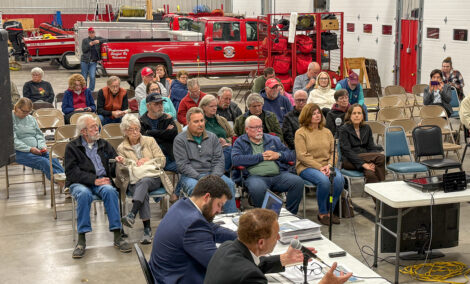State Brigadier General visits veterans court, speaks on resources
- Brigadier General Maureen Weigl talks about her position with the State of Pennsylvania as Deputy Adjutant General-Veterans Affairs at the Lycoming County Department of Veterans Affairs Tuesday April 25, 2023. DAVE KENNEDY/Sun-Gazette
- Brigadier General Maureen Weigl talks about her position with the State of Pennsylvania as Deputy Adjutant General-Veterans Affairs at the Lycoming County Department of Veterans Affairs Tuesday April 25, 2023. DAVE KENNEDY/Sun-Gazette
- Brigadier General Maureen Weigl talks about her position with the State of Pennsylvania as Deputy Adjutant General-Veterans Affairs at the Lycoming County Department of Veterans Affairs Tuesday April 25, 2023. DAVE KENNEDY/Sun-Gazette

Brigadier General Maureen Weigl talks about her position with the State of Pennsylvania as Deputy Adjutant General-Veterans Affairs at the Lycoming County Department of Veterans Affairs Tuesday April 25, 2023. DAVE KENNEDY/Sun-Gazette
For the 720,000 veterans in the state, not being aware that there are people and agencies to help them is one of the biggest issues they face according to Brigadier General (Pa.) Maureen Weigl, the Deputy Adjutant General for Veterans Affairs, who was visiting county officials yesterday.
“There are veterans that struggle with PTSD. There are veterans, female veterans that, you know, face housing and food insecurity. There are veterans that struggle with drug and alcohol addiction, opioid addiction, but the biggest problem is awareness. Where do you find resources? Do they know that this county office exists?” she said, speaking from the county’s Veterans Affairs Office.
“Do they know that they can come here and we can help you make a claim, or refer you to services? You know, we have great relationships with the VA hospitals. Do the VA hospital staff know all of the resources available in the communities? So if someone asked you where’s the homeless shelter? Where’s the closest food bank? Do we know? I think awareness is really what’s lacking so that when they come back, and all of a sudden they’re back in Williamsport, Pennsylvania, not at Fort Bragg or Fort Hood or San Diego, they know where to get the resources. You know they left as young kids at 17, 18, 19-years-old. They knew their high school teachers. Now they’re back as adults, right. And so we just want to make sure everyone has the awareness of where to find resources,” she said.
While she was in the area, Weigl visited the Veterans Treatment Court and met with Judge Nancy Butts and the treatment team with the court.
“So in my job, I have the opportunity to be anywhere from Philly to Erie and everywhere in between. I’m very supportive of the courts because it’s important to me to make sure that veterans that have unique issues and dynamics, get the care they need, and be able to succeed from this program and not come back into the program. We want to cut down on recidivism,” Weigl said.

The veteran courts are designed to address problems unique to veterans.
“So, many people come in from drug and alcohol abuse, right? That’s a symptom of a bigger issue. It could be post traumatic stress. It could be mild traumatic brain injury, it could just be not acclimating after they’ve transitioned from the service. So, you’re used to a military installation, you know where your care is on an installation. Do you know where the resources are in your community? And unfortunately, some of them struggle and they have different opioid addictions or drug and alcohol. So, where do they find the help?” Weigl asked.
“Unfortunately, by the time they come to the veteran court, they’ve already done something to get in trouble. So now we want to take care of them and get them into the treatment and the programs that they need. So they’ll go through the drug and alcohol step programs here on this program. They have a lot of work to do. It’s not an easy program through the veteran courts, but it’ll help them get better and the judge will hold them accountable. But the support from the county office and the parole officers is critical to their support,” she said.
There are 25 veteran’s courts in the state and, by visiting them, Weigl said she hopes to learn how the counties work together and about the programs that are working correctly and positively, so that counties can share their best practices with each other. The ultimate goal is to keep veterans out of the veterans service units that operate in some of the state’s correctional facilities.
“Great programs there, as well, where we take care of the veterans and make sure that veterans have a place to go when they leave and have a job. We want everyone to be contributing tax paying citizens again,” she said.

Brigadier General Maureen Weigl talks about her position with the State of Pennsylvania as Deputy Adjutant General-Veterans Affairs at the Lycoming County Department of Veterans Affairs Tuesday April 25, 2023. DAVE KENNEDY/Sun-Gazette
“So I like to come just to talk to the veterans. To see the team, to encourage them to keep working. Some days it’s easy. Some days it’s not. You have veterans that succeed and veterans that fail, and then we want to pick them back up, and bring them into the program as best you can. So it’s just nice to come out and learn, encourage and see if I can advocate for them if they need more resources,” she said.
Weigl also spoke to veterans in the program while at the court, words that W. Michael McMunn, director of the county’s Veterans Affairs office described as “heartfelt.”
“She encouraged them to keep up with their course of treatment and always to reflect back on their time in the service and the strengths that they had when they were in the service. Remember those and bring those forward to help in their rehabilitation,” McMunn said.
McMunn agreed with Weigl that one of the most pressing issues is getting the word out to veterans about what is available to help them no matter where they are in their journey.
“A couple of years ago I had a World War II vet — he was 93 years-old. He came into the office with his daughter, and we discussed getting him in healthcare and some of the other benefits he would have available. He said that he never knew that he had all those benefits available. Then I had a young fellow in here just yesterday, and he said that when he got out of the service, ‘They didn’t brief me on anything that I have available. In fact they told me that I didn’t have any benefits when I got out,'” McMunn said. “It runs the gamut.”

Brigadier General Maureen Weigl talks about her position with the State of Pennsylvania as Deputy Adjutant General-Veterans Affairs at the Lycoming County Department of Veterans Affairs Tuesday April 25, 2023. DAVE KENNEDY/Sun-Gazette
“It’s a never-ending battle to get people informed about what’s out there,” he added.
Weigl noted that veterans can get that information at county offices, like McMunn’s, but also through the state’s PA VETConnect.
“The Department of Military Veteran Affairs created a system for folks to find all of their Veterans Service Officers at their American Legions, VFWs and at their counties. We work really closely with all of them and we have about 1,900 nonprofits that are the lifeline to the support. They’re the ones that run all the programs that veterans might go to, to seek care,” she said.
Weigl, who had retired after 25 years, has had a varied career, starting as an ROTC graduate from the University of Pittsburgh.
When she was asked to come back and serve in her current position, her reaction was, “Are you kidding?”
“Of course this is like, I get to talk to veterans every day and figure out how to help them. I really go everywhere. I try to hit every county, try to talk to veterans. I drive home. I pass an American Legion, I’ll pop in sometimes, just to talk to folks to see what’s wrong. I’ll go to the homeless shelters and the stand downs on odd weekends just to go say hello. I run the six nursing homes in Pennsylvania. We have six long-term care nursing homes just for veterans and their spouses,” she said.
“They’re amazing. So if you were to pay for skilled nursing, which a lot of our Vietnam-era veterans are, it’s $20,000 a month. But if you’re in one of my nursing homes, and we help you get your VA disability rating, which your county offices can do, your cost of care is covered by the VA,” she said.
Always the advocate for veterans, Weigl had to mention the importance of employers offering veterans a job.
“Veterans bring so many benefits. There’s so many skills. If you hire veterans, there’s opportunities that they can get wonderful professional certifications for free. You know so there’s a lot of opportunities for employers around here to bring more veterans back to Pennsylvania. There are 200,000 veterans who leave active duty every year. How do we bring them here to Williamsport? Who are the employers? Do they know how to hire a vet and if not, tell them to call me,” she said.
“Reach out to me because there’s programs like DOD (Department of Defense) Skillbridge Program where you can have a veteran come and work for you for four to six months coming off active duty and then we hope they stay here,” she added.
For McMunn, having someone in Weigl’s position visit the county highlights the needs of veterans in rural settings.
“I think she listened at veterans court and heard, here’s an issue important in Central Pennsylvania. We have veterans out here who are just as involved and they have needs,” he said.
“I think she gets a different perspective on what goes on in rural counties,” he added.









